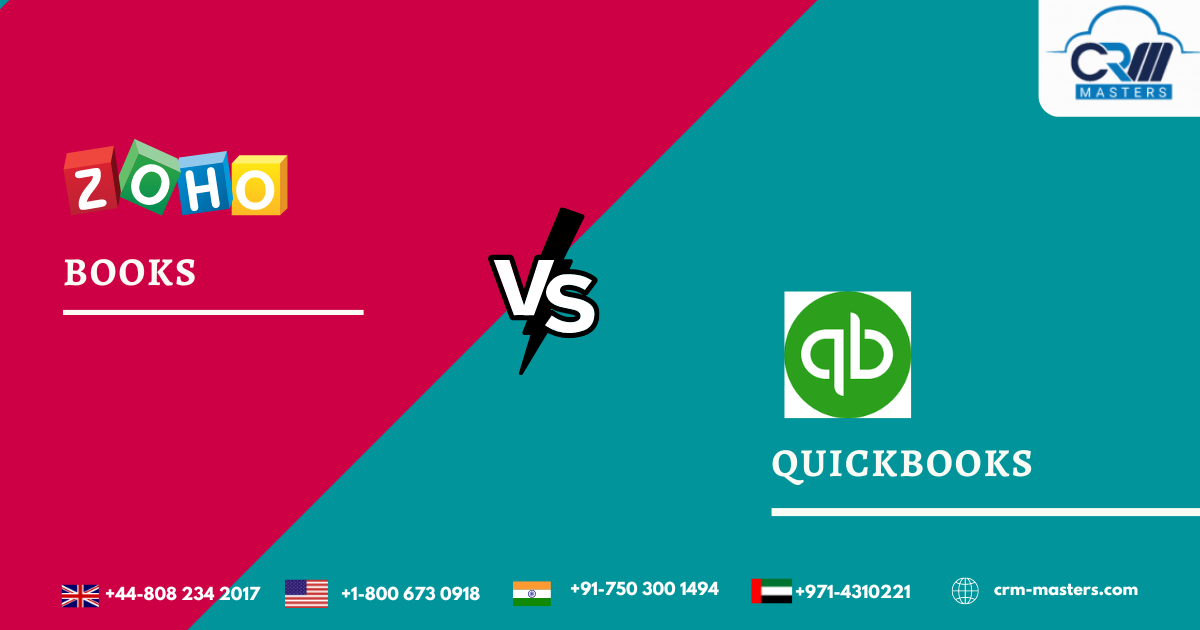
Zoho Books Vs QuickBooks: Which is Better?
Every business should invest in accounting software to manage its finances. It can help them in business performance analysis by facilitating invoicing, expense tracking, payroll, and financial management.
Zoho Books and QuickBooks are the market’s most popular cloud-based accounting tools but which is better?
However, finding the right online accounting solution with Zoho Consultant becomes easy for all sizes of businesses. This blog helps you decide which one is more suitable for your business.
About Zoho Books
Zoho Books serves as a comprehensive hub for everything related to accounting and more. It offers a complete accounting solution that enables companies to streamline their processes, monitor their finances, manage stock, balance bank statements, and collaborate effectively.
Zoho Books provides cost-effective solutions, a user-friendly platform, and quick-to-respond customer service, simplifying the process of managing finances for companies of every scale.
What is QuickBooks
QuickBooks is an accounting software developed by Intuit for small and medium-sized businesses to manage sales, expenses, and payroll functions. This platform provides a wide array of functions to track income, and expenses, create invoices, and pay bills to fulfill all accounting needs of businesses.
Zoho Book vs Quick Book
-
Invoicing
Zoho Books offers 16 ready-to-use templates for businesses to create flawless invoices. Businesses have the option to completely tailor these templates to match their unique brand styles. Through Zoho Books, businesses can streamline the task of sending out regular invoices to customers, which in turn, conserves significant time and resources. Additionally, the platform is equipped to handle invoices for retainer services. Zoho Books secures all PDF invoices, enhancing data protection and minimizing the risk of any data leaks.
QuickBooks has six fully customizable inbuilt templates for its customers, allowing companies to place bank transfer and payment gateway links directly in the invoice. You can also track and auto-schedule the invoices to know when your customers have seen them. Features like recurring invoices, reminders, and batch invoicing are offered in some of the subscription models. It also supports six different languages for sending invoices.
-
Payroll
Payroll management tools can assist in efficiently overseeing your staff by guaranteeing smooth business processes. Zoho Books offers assistance for different integrations such as Zoho Payroll and SurePayroll, enabling businesses to handle their employees. Zoho Payroll, service provides a 14-day trial period to allow users to explore the platform’s features.
QuickBooks offers three different payroll plans to choose from, and it is essential to note that payroll doesn’t come with your subscription and will cost you an additional fee.
-
Reporting
Both Zoho Books and Quickbook have a plethora of reports. Although both have more than other accounting software,
-
Customer Support
Efficient and responsive customer assistance enhances the dependability of any software. Zoho Books and Quickbooks provide outstanding support services to their clients. These accounting tools support their users through various methods such as phone conversations, messaging, and email.
However, Zoho Books is at the forefront as its premium plans enable you to make a direct call to a customer service representative. With QuickBooks Online Plus and the other more affordable options, you must first submit a request and then wait for a response. To enjoy immediate phone support, upgrading to the priciest plan, QuickBooks Online Advanced, is necessary.
-
Mobile App Functionality
Both offer excellent mobile accounting software, but Zoho Books includes functionalities that could be beneficial, such as the capability to record invoices and manage payments, as well as monitor the hours spent working. The Zoho Books mobile application, which provides all the functionalities available in the web-based version, is ideal for individuals frequently traveling, particularly those who require time tracking and invoice submission for their clients.
- Pricing
Zoho Books Provides three plans Standard, Professional, and Premium. Features like a client portal, automated payment reminders, and recurring invoices have been made available under the standard plan. Their pricing starts from $20 to $70 per month. It also offers a four-day trial and free plan to help the users get acquainted with the application.
On the other hand, QuickBooks offers three monthly subscription plans: Easy Start, Essential, and Advanced. Pricing starts from $10 to $60 per month. Features like Zoho Books can be easily found in this too. They also offer a 30-day trial period to the users.
Unlike QuickBooks, Zoho Books offers monthly and annual plans, and businesses can save a lot by taking up a yearly subscription.
- Ease of Use
No one wants to deal with complicated applications. That is by Zoho Books, and QuickBooks comes with an easy-to-use and user-friendly interface. Some features are hidden within the other elements, which may seem difficult a few times at first, but one will get used to them eventually. Customer Support is always there to help the users if they are facing any difficulty and can help them come back on track.
Conclusion
Zoho Books and QuickBooks are distinguished as dependable accounting software with distinct benefits in this brief analysis. Zoho Books provides simplicity and affordability. Although QuickBooks provides unmatched flexibility. The decision depends on the unique requirements of the business. Whether opting for QuickBooks’s adaptability or Zoho Books’s user-friendliness, both options empower businesses to handle their finances in their preferred manner efficiently.
Select CRM Master’s Infotech for Zoho Implementation services to ensure you make the best decision for your company. Our extensive experience offers you top-notch implementation at reasonable costs.
Sweet Bonanza 1000 shining crown Shining Crown matbet Sweet Bonanza 1000 Fortune Rabbit pusulabet İmajbet












